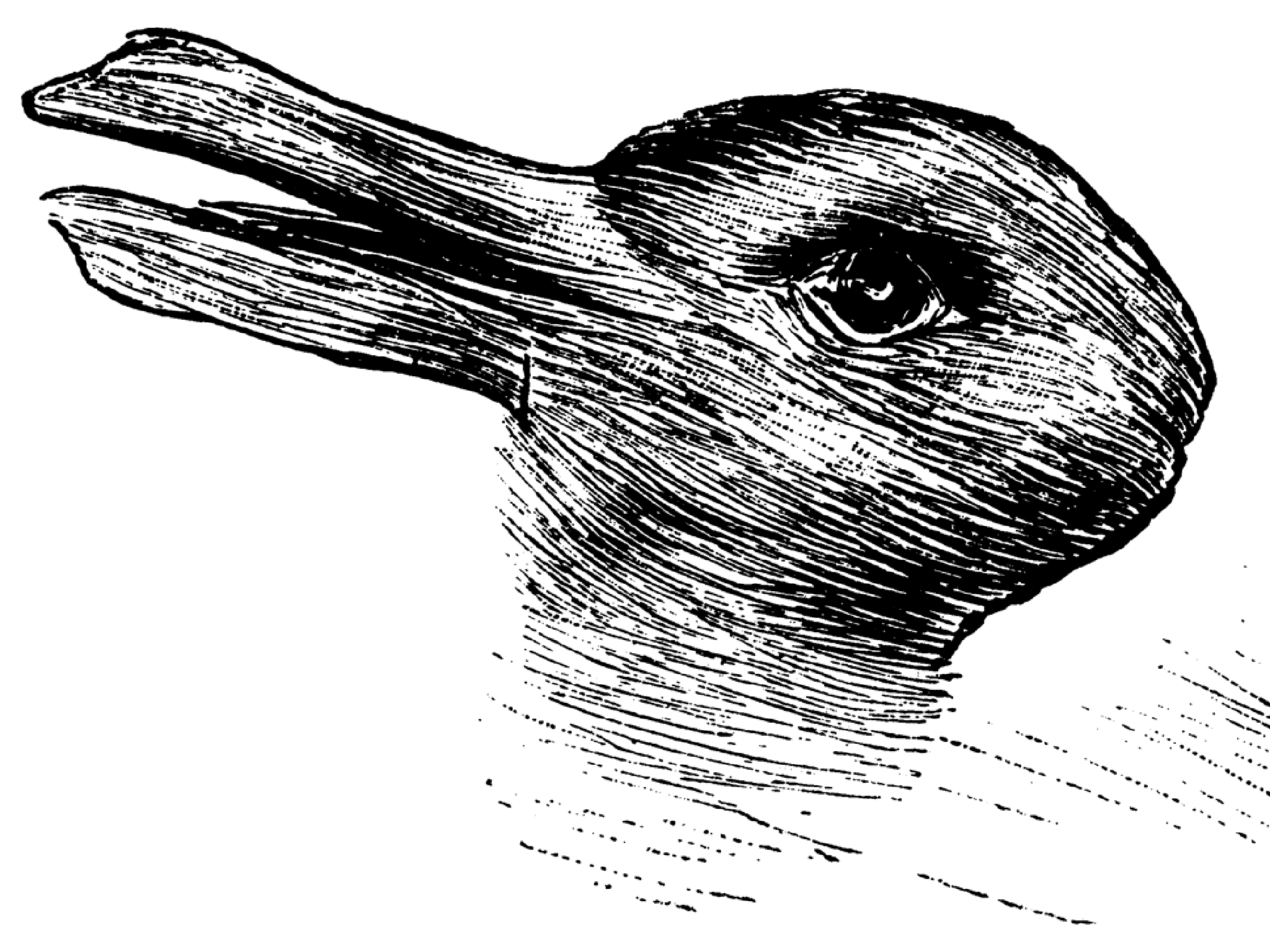
1. How were optical illusions created?
This first subquestion will give me some background information on how optical illusions came to be. By researching how they came to be and their purpose, I believe it will help me and others better understand what exactly optical illusions are. They can be many different things but they all have a relationship with one another. When I figure out how they were made, I can make the connection to how they analyze a person on a psychological level. I know what they are for and why they were made, but the how is what I need to research more about due to of their purpose today. Because why does it matter whether we see a duck or the rabbit first right? How these illusions were invented will lead back to my question because I get to learn on how people were led to believe they can tell you a huge part of your personality.
2. What is the theory behind optical illusions?
I know that a lot of uncertainty still lies around these deceptive images today. They may not hold much significant data but they were created with the idea that they send messages to the brain in a way where it cannot properly process it. It had potential. When optical illusions were created, people had to have had an assumption on why different things are seen by different people. Everyone interprets things differently but optical illusions are more of a test to depict traits of someone’s personality. This will give me some context on how optical illusions work and why looking at the theory behind them, it will allow me to look at my inquiry from a scientific approach.
3. How true are the tests of optical illusions?
While it seems like all fun and games to look at optical illusions, to what extent are they telling the truth? The third step is to help me research their authenticity. Some might say it’s just a coincidence while others will say it’s real and it’s just a visual illusion because “seeing is believing”. That is exactly what I would like to find out more about. Hopefully, with some trial and error, I can compare different images as well. Looking up information on this question will help address my main inquiry question because it will likely be the factor that breaks the ice on whether they are accurate or not.
While my inquiry question is not the most deep and community based kind, I think that this question will have implications on people who want to know deeper parts of themselves. Sometimes it can be hard to explain your personality on the basis of why you do the things you do, the way you think, and how it can affect your life. Optical illusions also help us understand the relationship between our brain and eyes. What we see compared to what we think. Personally, optical illusions help me discover more about my perspective on things and reflect on my traits! I hope these questions will further that research. Thank you!
Sites to help:
https://www.amnh.org/explore/ology/brain/optical-illusions-and-how-they-work#:~:text=Your%20senses%20gather%20information%20and,that%20isn%27t%20even%20there!
https://www.vox.com/science-and-health/20978285/optical-illusion-science-humility-reality-polarization
https://timesofindia.indiatimes.com/life-style/health-fitness/de-stress/optical-illusions-say-a-lot-about-your-personality-find-out-how/photostory/90622438.cms?from=mdr
https://abcnews.go.com/Health/EyeHealth/optical-illusions-eye-brain-agree/story?id=8455573#:~:text=In%20other%20words%2C%20they%27re,visual%20illusions%22%20is%20more%20appropriate.
https://htschool.hindustantimes.com/editorsdesk/knowledge-vine/optical-illusions-tracing-their-origin-and-evolution#



Hi Vea,
This looks like such an interesting project! Optical illusions are so fun and entertaining, it’ll be really interesting to understand how they actually work and what the science behind them is.
Here’s an article you might find interesting for the rest of your posts: https://science.howstuffworks.com/optical-illusions.htm
Good luck with your future posts!
Aniela
Hi Vea,
This appears to be an intriguing project! I can’t wait to read your next post. I’m fascinated with optical illusions and would like to learn more about them. Your subquestions appear to be ideal for helping you in determining your big answer to the main topic question. I found these websites in the hopes of helping you with your project.
https://science.howstuffworks.com/optical-illusions.htm
https://www.vox.com/science-and-health/20978285/optical-illusion-science-humility-reality-polarization
I hope this comment was useful.
– Dara
Hey Vea!
I love your topic so much, I’ve never really thought about the inner workings of optical illusions until your posts! Your project plan sounds amazing, I love how you break down each step into its own “topic” and yet connect them together at the very end and implying them towards the wider community. Although you mention the topic not being that “deep” etc, I believe it is topics like these which help us the most as they are every day things we look over most times that can be really useful to us if we pay more attention. Hence why I love the direction of your research. Something, I thought of while reading your post, especially in your second step about the theory behind optical illusions, have you thought of looking at nature and the visuals which natural optical illusions offer for humans? here is a link to a source that shows some natural optical illusions that you may be interested in just for some visuals! As a visual learner, seeing things with my own eye is crucial, and since you’re doing optical illusions you may be interested in these sources for those who are visual learners as well.
https://projecteuler.net/problem=2
In addition to that here are some other resources that goes into the philosophical idea of optical illusion that may aid you in your research!
https://aeon.co/essays/optical-illusions-fool-the-eye-but-they-educate-the-mind
(I personally enjoyed this one the most)
https://philosophy.stackexchange.com/questions/8790/what-do-optical-illusions-or-other-illusions-say-about-our-perceptions-or-sens
https://www.frontiersin.org/articles/10.3389/fnhum.2022.875829/full
Hope it helps!
– Sanam M.